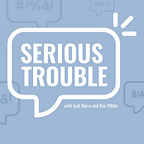Dear listeners,
This week’s show takes a look at federal charges in the widely discussed Charlotte train murder case. Decarlos Dejuan Brown, caught on camera stabbing Iryna Zarutska, has been charged with a federal capital crime. Murder, of course, is not generally a federal crime. But because the murder happened on a train, the Feds have charged it as a violation of 18 USC § 1992, which prohibits “an act, including the use of a dangerous weapon, with the intent to cause death or serious bodily injury to any person” in various transportation-related places, including on train tracks.
As Ken notes, this statute was designed as an anti-terror one, and many of its other provisions refer to more classic terrorism-type situations, like the use of biological agents on trains, or attacks on vehicles containing nuclear waste. But subsection (a)(7) of the statute is written — intentionally or not — in a way that plausibly turns any assault with a dangerous weapon on a train into a federal crime (and, if the assault leads to death, a federal capital crime). Using the law this way isn’t an innovation by the Trump administration: Under President Biden, federal prosecutors used the same law to prosecute a man who shot several passengers (but did not kill any of them) on a New York City subway train.
Meanwhile, the Supreme Court will soon weigh in on the IEEPA tariffs case — the court has set a fast briefing schedule and will hear arguments in June. Because of the scrambled ideological alignments seen in the lower courts, it’s hard to predict what the court will do on the issue. But on other topics — including a dismissal from the Federal Trade Commission board and the rules governing ICE raids in Los Angeles — the court has given the Trump administration further relief on the shadow docket and appears likely to do so in final judgments as well.
That’s all in this week’s show, plus: The Babylon Bee lawsuit that got California’s anti-deepfake law thrown out as unconstitutional; FBI agents suing over their political terminations (and why they stand a better chance in the courts than the various fired commissioners); the collapse of Michigan’s fake elector prosecution; another court decision upholding a judgment E. Jean Carroll won from President Trump; and the unhinged pro-se filings from would-be Trump assassin Ryan Wesley Routh (filed, of course, to Judge Aileen Cannon).
We hope you enjoy the episode,
Josh







